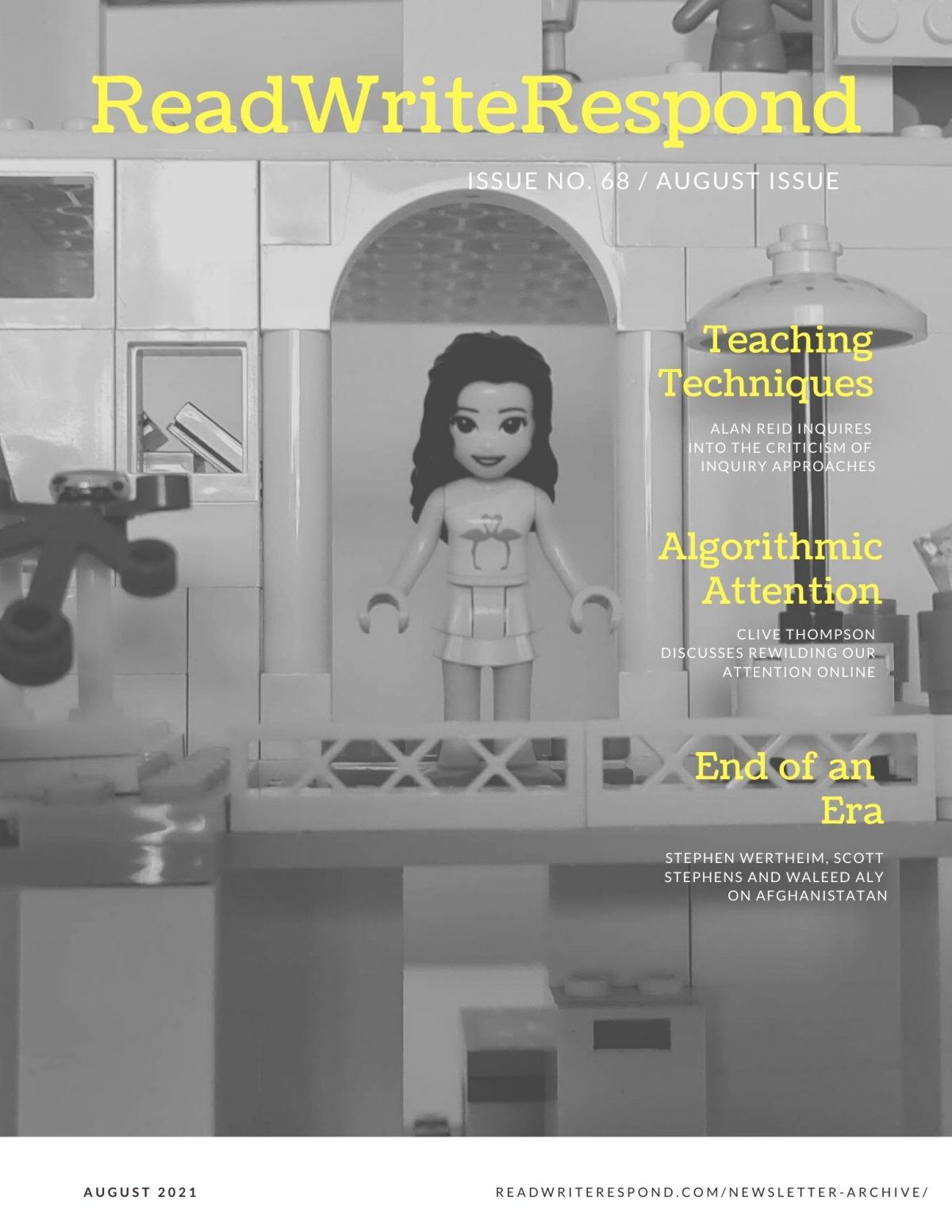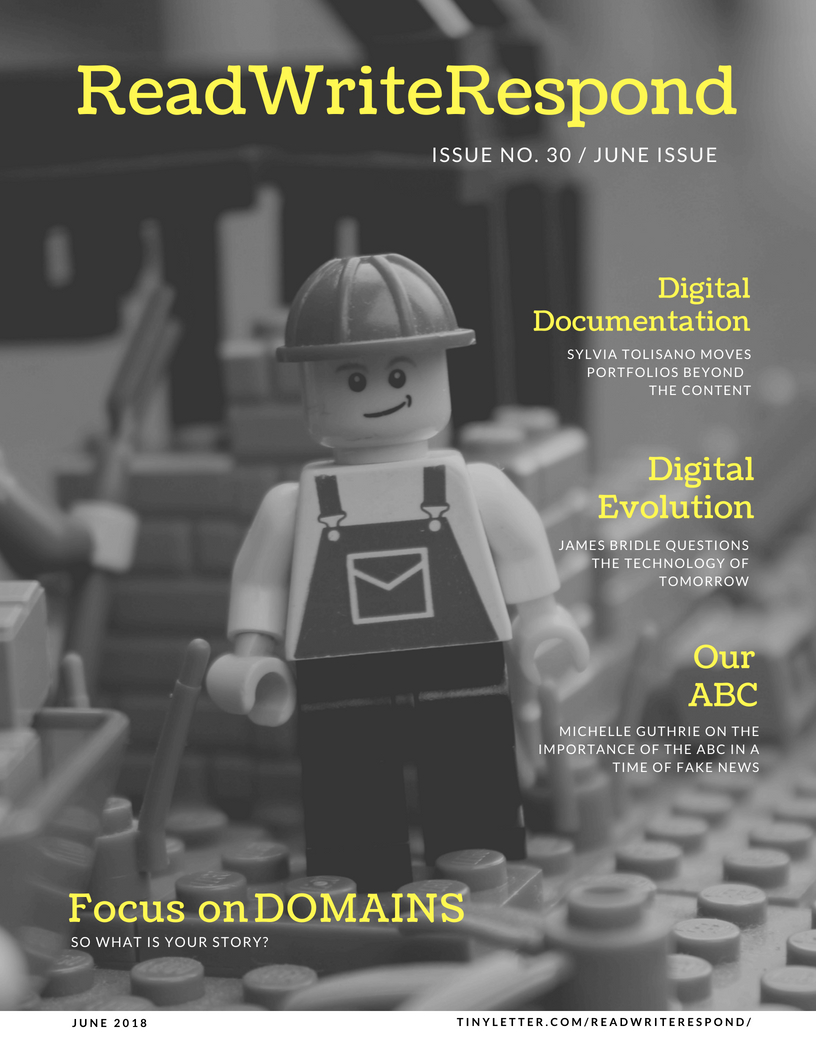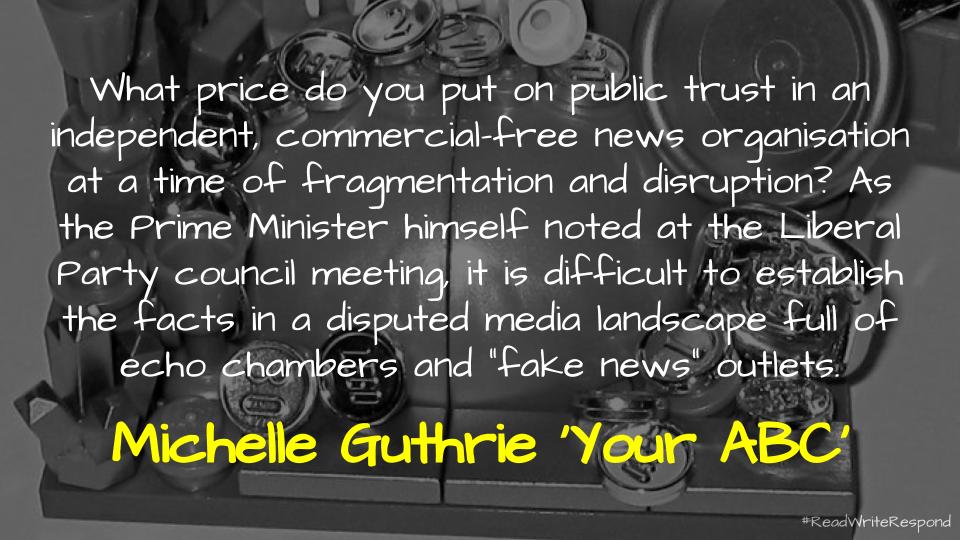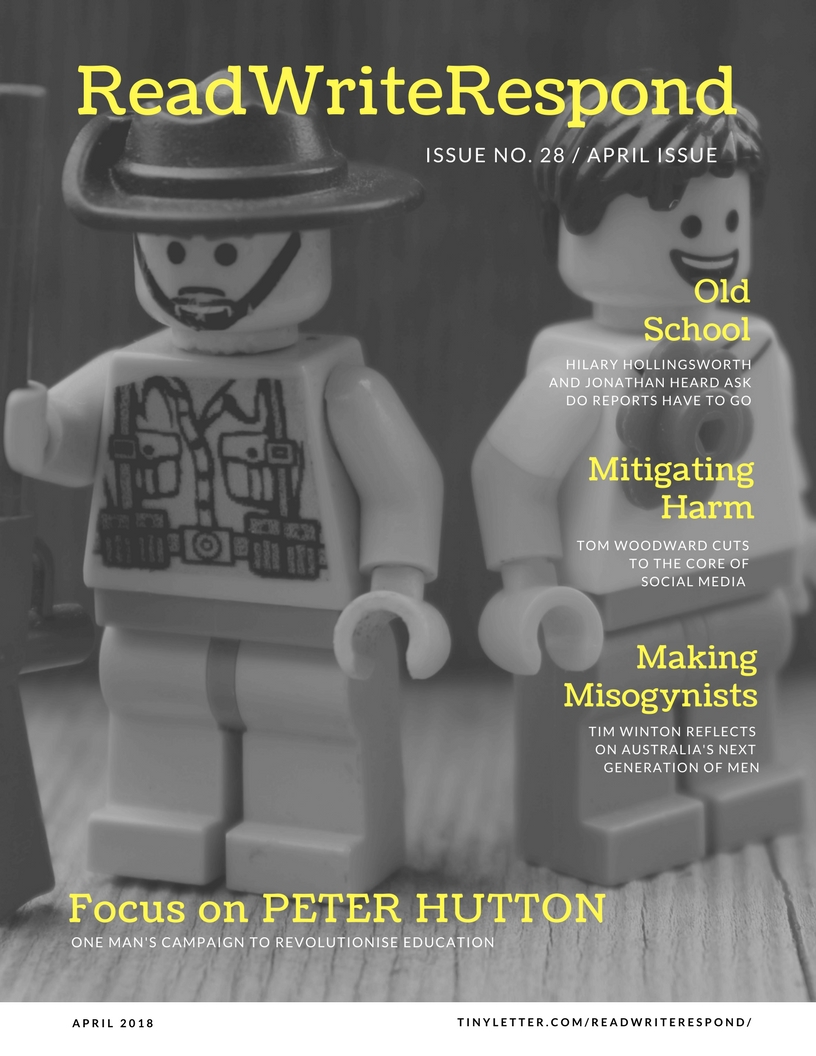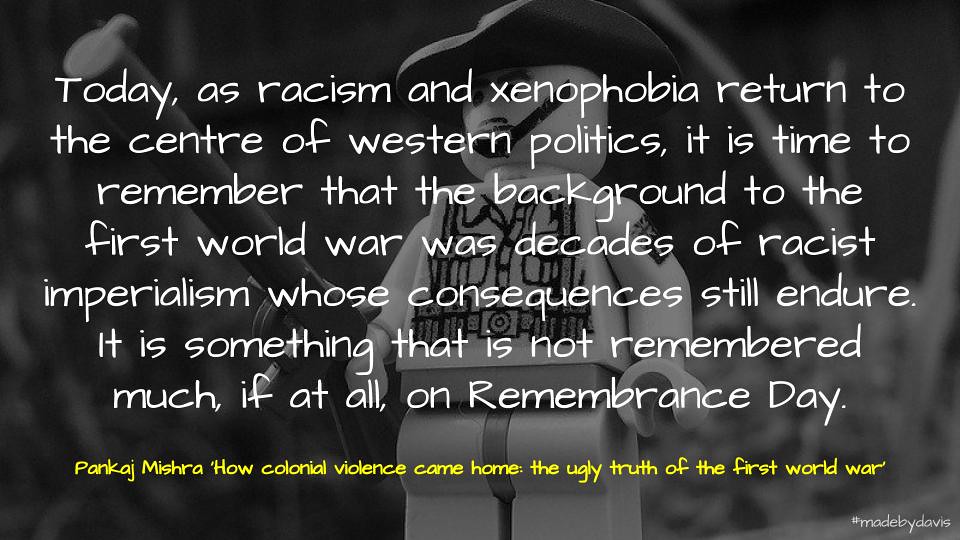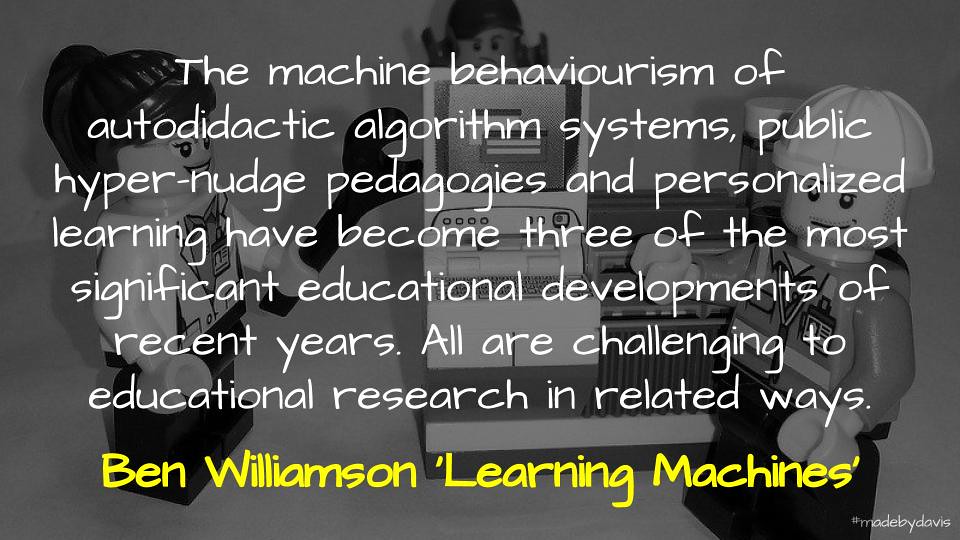For the past few years I have written both a December newsletter, as well as a summary of the whole year (see 2016 and 2017). As Decemeber’s highlights are included within the summary, I decided to just do one.
If you are interested in the links and ideas that have left me thinking this month then you can find them here. I also wrote three longer posts:
2018 in Review
My work has continued to evolve this year. New name (‘Subject Matter Expert’) and new team. However, much the same work supporting reporting, attendance, timetabling and other structured elements of community engagement. It is all a reminder that technology is a system with a lot of inter-dependencies.
As a part of the wider engagement around the project I am working on, I continued to participate in a collective exploring ongoing reporting. This included a presentation from Hilary Hollingsworth. I also presented at #EdTechTeam Summit in Canberra and K-12 Digital Classroom Practice Conference.
On the family front, our children have continued to grow and learn. This has included both excelling in their swimming and music lessons. I have continued to educate them on quality pop music (cue analogue synthesisers).
We went on a few trips to Bendigo, Fiji and Adelaide. Fiji was in part to celebrate our ten year wedding anniversary.
This year we also discovered Village Junior. In the days of digital downloads and dwindling numbers, it was a reminder that sometimes the opportunity is to be different. With various activities for children beforehand, a built in intermission and lower seating, it is a reminder of the power and importance of experience.
On the personal front my focus this year was on ‘intent’. I have being continued to develop my digital commonplace book all year. This has lead to writing less longer posts and instead focusing on my collection of ideas. I have also consolidated some of my practices.
In regards to creations and contributions I added my thoughts to Benjamin Doxtdator’s podcast on taking pause and explored the world of Microcasts.
Looking back, I have not read (or finished) as many books as previous years and have failed miserably when it comes to participating with a range of MOOCs, challenges and reading clubs. The one book that did leave me thinking was the New Dark Age by James Bridle.
My top five albums this year were:
- Depth of Field (Sarah Blasko)
- Lilac Everything (Emma Louise)
- Isaac Gracie (Isaac Gracie)
- Wildness (Snow Patrol)
- MassEducation (St. Vincent)
You can read my further thoughts here.
Learning and Teaching
My Favourite Inquiry Journeys of 2017…. – Kath Murdoch stops and reflects on twelve projects she helped with in 2017. In summary, she pulls out some of the key aspects that went across all the different inquiries, such as authenticity, integrative, involves experts, learning is shared and emergent. This post is not necessarily a list of driving questions and/or units to roll out, but rather a source of ideas and inspiration. Along with her post on ten practices of an inquiry teacher and AJ Juliani’s reflection on choice-based learning, they provide some useful provocations for reimagining learning.
Mulling Time – Emily Fintelman reflects on the need to find time to mull over things. To do this, she suggests scheduling time, finding a challenge partner and recording your thoughts. Coming from the perspective of comprehension, Julie Beck argues that unless we do something with what we have read within 24-hours then we often forget it. She recommends slow reading to provide time to take things in. This builds on Ryan Halliday’s point to do something with what you read. I am left wondering about the place of digital literacies to support all of this.
My Learning – It has been fascinating following Greg Miller’s thinking in regards to the construct of learning. There are many assumptions that go unquestioned in schools, I am finding that as I discuss reporting with more people. This move towards self-directed learning reminds me of the work going on at Geelong College and Templestowe College. My wonder is how we manage to marry these changes with various expectations, such as timetables.
Does the old school report have a future? – Hilary Hollingsworth and Jonathan Heard provide some background to student reporting in Australia. One of the challenges they highlight is the difference between progress and achievement. I have a long history with reporting, one challenge not addressed in this post are the constraints put in place by the platforms and providers of the reporting packages. It would seem that ongoing reportingprovides more flexibility. My question is what the future holds for biannual and ongoing reporting, especially in light of ‘Gonski 2.0?
21 simple design elements that will make any School Assessment Task sheet accessible: Haley Tancredi, Jill Willis, Kelli McGraw and Linda Graham reflect on the assessment task sheet so common in the secondary classroom. Responding to the challenge of accessibility, they collect together a number of suggestions to support all students. This list is organised around visuals, clarity and directions.
Digital Portfolios and Content: Silvia Rosenthal Tolisano unpacks a number of questions and considerations associated with digital portfolios. This includes being open to authentic audiences, reimagining the idea of branding, creating a consistent habit and ethically using content. In a separate post, Diane Kashin reflects upon the interpretative nature of documentation. It can be so easy to discuss the use of technology to support the process, however this is often to no avail without pedagogy and a purpose.
Teaching Game Design with Bill Cohen (TER Podcast): Cameron Malcher interviews Bill Cohen about game-design through play-based learning. Cohen goes beyond the usual coding and computer-aided approaches to focusing on ‘low-tech’ games. This included engaging with board games and outdoor games. This play-based approach focuses on developing clear metalanguage, feedback for mastery and working with an iterative design process. This reminds me in part of Amy Burvall’s notion of ‘rigorous whimsy‘ and BreakoutEDU. Some resources Cohen shared include Boardgame Geek and Lady Blackbird, while in a separate post, Clare Rafferty shared a list of games associated with History. For a different take on games, in a recent episode of the IRL Podcast, Veronica Belmont and Ashley Carman look at gamification in everyday life. Some examples of this include notifications on smartphones, likes and retweets on Twitter or the endorsements on Linkedin.
Twenty Two Projects to Challenge, Inspire and Engage Your Students: Bianca Hewes collects together a number of her project outlines that she has created with Canva. As with Kath Murdoch’s inquiry journeys, Hewes provides some great provocations. Although some of them could easily be translated, their strength lies in thinking differently. In addition, I too like Canva and use it to create the covers for this newsletter. For a different take, check out Benjamin Doxtdator’s investigation of the history of PBL.
Flip the System Australia: Jon Andrews discusses the work of some of the school leaders pushing back on the accountability agenda to respond to the questions and concersn of their own contexts. Along with posts from Deborah Netolicky and Cameron Paterson, the editors of Flip the System Australia provide an overview of the various pieces included in the book designed to provide an alternative voices within the educational debate. An interview from the ACEL Conference was also featured on the TER Podcast.
Making change in education – champions are for charlatans: Dave Cormier reflects upon the change approach of “working with the ‘willing’ first” and wonders if this is wrong approach. Rather than sustainable change, focusing on the guaranteed +1 is both unethical and creates a super star culture. Something I have touched upon in the past. Cormier instead argues that the focus needs to be on long term change, with a plan to solve an actual problem. Associated with this, it is important to make space for such change, what Tom Barrett describes as innovation compression. This is also something that I have discussed in regards to my concern about ‘great teachers’. Rather than the right teacher, I would argue that we need to focus on the right culture and environment. Cormier also addresses this in regards to the complex versus the complicated.
The ‘Future Book’ Is Here, but It’s Not What We Expected – Craig Mod reflects on ‘books’ and the way in which they have and haven’t evolved overtime. He discusses the hype around interactivity that has never quite come to fruition. Tim Carmody suggests that the idea of a networked collection of texts. Daniel Willingham argues that reading and listening to texts are best suited to different purposes, and neither is superior. Antony Funnell leads a conversation into some of the changes associated with new markets and mediums.
Technology
Panicked about Kids Addiction to Tech? – danah boyd suggests that there is a lot of hype associated with kids addiction. Some of the problems may be associated with parents themselves. In response, she provides two activities for parents: verbalize what you’re doing with your phone and create a household contract. Mitchel Resnick’s provides a different perspective, suggesting time on task is not the problem, it is rather what is done with that time, for Cory Doctorow it is all an arms race focused on control, while Audrey Watters paints her own complicated picture of addiction. Each of these pieces add to a wider dialogue around moderation and other such technical answers currently being suggested as soutions to our digital overload.
The #1 reason Facebook won’t ever change – Om Malik explains why Facebook will not be changing, as it is not in its DNA to do so. This is epitomised by recent spamming of two-factor authentication users and the skimming of VPN data only adds to this. Even with the personal adjustments to the feed in response to issues with fake news and manipulation, this is akin to the spin by the tobacco industry to hide the effect of smoking. On a side note, Douglas Rushkoff made the case on the Team Human podcast that other than teaching media, social media (Twitter, Facebook, Instagram etc) should never be used by schools. Use blogs or a space you manage yourself and your story – something that I have touched upon in the past – but to feed the ad algorithms as a way of ‘connecting’ is the wrong approach according to Rushkoff.
You Think You Want Media Literacy… Do You? – danah boyd discusses concerns about the weaponising of media literacy through denalism and says that there is a need for cognitive strengthening. Benjamin Doxtdatorraises the concern that focusing on the individual. Instead he suggests considering the technical infrastructure. Maha Bali argues that we need aspects of both. In a response to the various criticisms, boyd admits that she is not completely sold on the solution, but we need to start somewhere.
Social Media Jujutsu – Tom Woodward reflects on the stresses of social media and shares a number of tools for mitigating the harm. This includes add-ons which hide Twitter metrics and tools which adjust your language. He also touches on some strategies, such as commenting on sites more than social media. Depending on your platform, I would recommend exploring the #IndieWeb and activating webmentions. Micro.blog also offers a simple #IndieWeb entry point to claiming the web, especially in regards to RSS.
Better visions of ourselves: Human futures, user data, & The Selfish Ledger: Ian O’Byrne reflects on the internal video produced by Google Project Xfocusing on speculative design the notion of a ledger that does not actually belong to the user, but managed by some grand AI. Although this was designed as a case of ‘what if’, it is a reminder of what could happen. It therefore provides a useful provocation, especially in light of Cambridge Analytica and GDPR. O’Byrne suggests that this is an opportunity to take ownership of our ledger, something in part captured by the #IndieWeb movement. Not sure what this means for our digitally proficient three year olds. Douglas Rushkoff makes the case for including less on the ledger, not more.
Rise of the machines: has technology evolved beyond our control?: In an extract from James Bridle’s book New Dark Age: Technology and the End of the Future, he discusses the evolution of the machine. This includes the place of the cloud, algorithmic interactions within the stock marker, the corruption of the internet of things and incomprehensibility of machine learning. It is one of a few posts from Bridle going around at the moment, including a reflection on technology whistleblowers and YouTube’s response to last years exposé. Some of these ideas remind me of some of the concerns raised in Martin Ford’s Rise of the Robots and Cathy O’Neil’s Weapons of Math Destruction.
Webmentions: Enabling Better Communication on the Internet: Chris Aldrich provides an introduction to webmentions. This includes unpacking the specification, the notion of mentions, the idea of kinds and way in which sites are potentially able to connect two-ways. This continues Aldrich’s efforts to document the IndieWeb, which has included a thorough overview of the IndieWeb, the future of feed readers and reimagining academic research. This introduction is different to Aaron Parecki’s guide to sending your first webmentions or breakdown of the oAuth standard.
Leave No Dark Corner: Matthew Carney provides an insight into the digital dictatorship that China is exerting over its citizens through the use of “social credit”. This is a part of the wider global push of surveillance to use facial recognition in schools, universities and shopping centres. Yu Hua provides a different perspective on China’s rise, looking at the changes in generations. Foreign Correspondence also reported on the topic.
Silicon Valley’s Saudi Arabia Problem: Anand Giridharadas explores Saudi Arabia’s growing involvement with Silicon Valley. Through their investment in SoftBank, they have invested in a long list of startups including Wag, DoorDash, WeWork, Plenty, Cruise, Katerra, Nvidia and Slack. The question is at what cost? Silence? Support? With the recent disappearance of a Saudi Journalist, Jamal Khashoggi, these are compromises that need to be considered. Listen to the recent episode of the Have You Heard podcast for more on Anand Giridharadas’ work. Also read the work of Audrey Watters and Benjamin Doxtdator for more discussion on investment in Silicon Valley (and subsequently EdTech).
Reflections on the smart phone: Antony Funnell speaks with Professor Genevieve Bell, Ariel Bogle, Distinguished Professor Larissa Hjorth and Emma Bennison about the history and affordances of the smart phone. They discuss the walled garden created by apps, the way devices inform our humanness, the cross-cultural appropriation of new technologies, support for accessibility and the surveillance built in. I have been thinking a lot about smart phones lately, especially while reading James Bridle’s New Dark Age and Adam Greenfield’s Radical Technologies. The conversation that I think is interesting is whether there is a future beyond the templated self produced by a handful of social silos.
7 Ps of Platform Education – Naomi Barnes explores the effect of the platform economy on education. She breaks this investigation down into seven considerations: platforms, publics, profiles, produces/prosumers, professional expectations, policy and performativity. In closing, she highlights three points to be taken from all this: platform education is here and there is no pragmatically viable way to avoid it, social media policy makers should be aware of the ebbs and flows of social media platforms and factor that into workload and human resourcing, and policy makers must be aware of the effect of their presence on social media. This touches on the work of Ben Williamson and his book Big Data in Education.
Reflections and Storytelling
Social Media Has Hijacked Our Brains and Threatens Global Democracy – David Golumbia discusses some of the changes to democracy associated with social media. He argues that we have lost the ability to think slowly, therefore making us more susceptible to irrational decisions. This touches on some of Peter Skillen’s points from a few years ago. Along with Zeynep Tufekei’s concern about free speech and Jordan Erica Webber’s look into micro-targetting, these posts paint a grim view of the future.
Building Staff Culture: The Importance of Gratitude – Chris Wejr reflects on his efforts to be more grateful and embed opportunities for his staff to do the same. He provides a list of possible activities to use. I have written about improving staff morale in the past. Wejr’s list provides some new ideas to explore.
How to Keep Going – Austin Kleon reflects on the life of an artist and outlines ten things to consider in order to keep on going. Some of his suggestions include treating everyday like Groundhog day, building a bliss station and going for a walk to scare off the demons. Some other tips for staying focused include Jenny Mackness’ reflection that the last step does not matter, Jeff Haden’s suggestions that planning for a holiday is more beneficial than the holiday or Seth Godin’s reminder that the goal is change, not credit.
About the boys: Tim Winton on how toxic masculinity is shackling men to misogyny – In an excerpt from a speech, Tim Winton says that it is men who need to step up and liberate boys from the culture of toxic masculinity that has come to mark Australian society. Along with Molly Ringwald’s reflections on the problematic art of John Hughes and Phil Cleary’s post on the misogynistic subculture of football, they represent a challenge for equity. It is also interesting reading these pieces alongside Kate O’Halloran’s article on the fear associated with women, exercise and sport.
What We Talk About When We Talk About Digital Capabilities: In a keynote at the UCISA Digital Capabilities event at Warwick University, Donna Lanclos unpacks the effect of analytics and the problems of profiling when trying to identify improvements. A skills approach is an issue when decisions get made on your behalf based on the results of a preconceived checklist. Lanclos suggests that we need to go beyond the inherent judgements of contained within metaphors and deficit models, and instead start with context.
Your ABC: Value, Investment and Return for the Community: In response to the recent call to sell the ABC, Michelle Guthrie presents a speech explaining the value of the Australian Broadcasting Commission in today’s world. I must be honest, I don’t listen to ABC radio as much as I used to, however I follow a number of podcasts, such as RN Future Tense, and often turn to their website as a first port of call for news. In a time when there is a lot of discussion about the ownership of core infrastructure, it seems strange to sell the ABC. I wonder if this is a reflection of the changes to the media landscape that my nostalgia is overlooking?
Throwing Our Own Ideas Under the Bus: Ross Cooper discusses the idea of putting your worst foot forward taken from Adam Grant’s book Originals. This involves trusting the idea at hand and starting with reasons why it might fail. Cooper suggests that this can be useful as it disarms the audience, critique involves effort, helps to build trust and leaves audience with a more favourable assessment. He also looks at this alongside Simon Sinek’s concept of ‘start with why’, highlighting the reason why and the challenges that might be faced. I wonder if the challenge in focusing on the why and why not is about finding balance? This reminds me of Malcolm Gladwell’s discussion of Generous Orthodoxy.
Virginia Trioli on being a difficult woman in a difficult world: In a speech at the Women In Media Conference, Virginia Trioli reflects on the challenges of being a women in the media. She shares a number of anecdotes that remind us that even with the #metoo movement, that we still have some way to go in regards to gender equality. Some of the advice Trioli recommends are to learn from your mistakes, own who you are and regularly take stock of where you are at. These lessons are useful for anybody (man or woman.) This post and Emma Watkin’s story are also reminders that so often there is more at play that goes unrecognised.
The Comforting Fictions of Dementia Care: This lengthy read provides an interesting insight into the life and times of those with dementia. It reflects on the changes in care, with the move away from drugs and creating the conditions to support memory. Associated with this is the problem of lying and memory. It is interesting to consider this alongside Clive Thompson’s book Smarter Than You Think, especially in regards to his discussion of memory and technology. This also reminds me of the episode ‘San Junipero’from Season Three of Black Mirror.
When Elon Musk Tunnels Under Your Home: Alana Semuels explores the intricacies associated with Elon Musk’s boring project in Los Angeles. She highlights the many ways in which innovation is able to bypass the rules and regulations that hamper the development of public infrastructure. For me this is highlighted by fifty year plan associated with transport in Melbourne. I agree with Semuels’ that it would be better to see such time and money spent supporting the state, rather than endlessly trying to circumvent it.
The Problem with Feedback – Megan Ward looks back at the history of feedback. She touches on its origins associated with improving machine efficiency and explains how it has been appropriated in recent times as a tool for managing people. Ward explains that this confuses things and in the process we risk making the activity one of noise, rather than any sort of meaning. This is interesting reading alongside the use of feedback in education. For me one issue is that data is never pure. This is something that Adrian Camm also discusses upon in regards to trust and coaching.
A Year in Focus
Each month I focus on a particular topic. Sometimes it relates to what has been occurring, but other times it is based on personal points of interest. Below is a list of all the focuses in 2018:
- Digital Hygiene – a series of posts by Ian O’Byrne supporting users with reviewing their digital presence online.
- Polarisation – A collection of the texts and selections associated with the pop-up MOOC Engagement in a Time of Polarisation.
- Cambridge Analytica – A wide collection of responses to the crisis.
- Peter Hutton and the EdRevolution – Posts, videos and podcasts featuring Peter Hutton and his work at Templestowe College to drive change from the ground on up.
- GDPR – Posts to provide a starting point as to what it all means.
- Why Domains – Responses to Alan Levine’s call for reflections on ‘why domains’
- Space – A collection of posts exploring the impact and influence of space on learning.
- Modern Learning Canvas – resources and examples associated with the Modern Learning Canvas and Richard Olsen’s Inquiry Oriented Innovation process.
- Twitter – Resources and reflections associated with Twitter.
- #CPDin140 – Ian Guest went back over his thesis looking at Twitter summarising a number of key points in preparation for his successful viva.
Read Write Respond #036
So that is 2018 for me, how about you? As always, happy to hear.
Also, I am interested if anyone has any feedback on the style and structure of this newsletter. I would love to know if there are things that people like or if there are things that you would change? I am looking to change things up in the new year.

Cover image via JustLego101.







